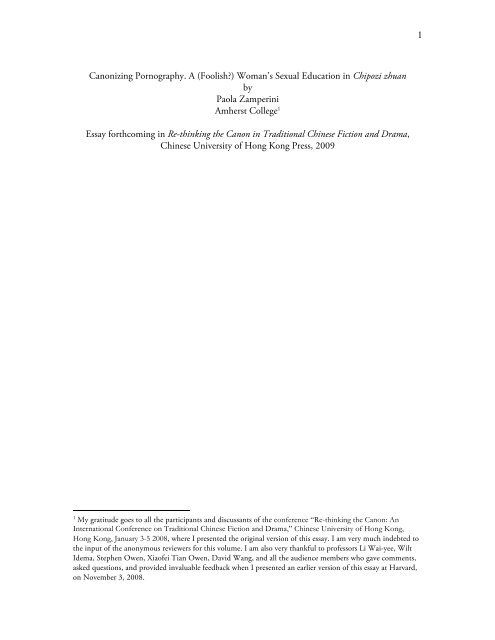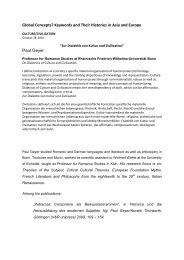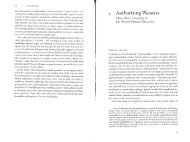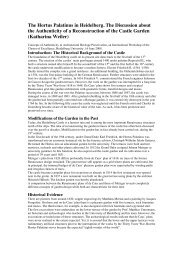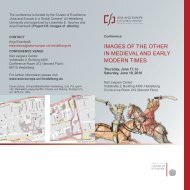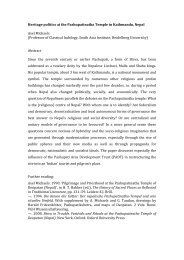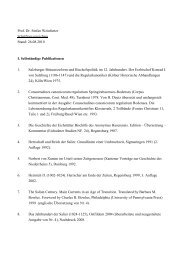"Canonizing Pornography". - Cluster Asia and Europe
"Canonizing Pornography". - Cluster Asia and Europe
"Canonizing Pornography". - Cluster Asia and Europe
Create successful ePaper yourself
Turn your PDF publications into a flip-book with our unique Google optimized e-Paper software.
<strong>Canonizing</strong> Pornography. A (Foolish?) Woman’s Sexual Education in Chipozi zhuan<br />
by<br />
Paola Zamperini<br />
Amherst College 1<br />
Essay forthcoming in Re-thinking the Canon in Traditional Chinese Fiction <strong>and</strong> Drama,<br />
Chinese University of Hong Kong Press, 2009<br />
1 My gratitude goes to all the participants <strong>and</strong> discussants of the conference “Re-thinking the Canon: An<br />
International Conference on Traditional Chinese Fiction <strong>and</strong> Drama,” Chinese University of Hong Kong,<br />
Hong Kong, January 3-5 2008, where I presented the original version of this essay. I am very much indebted to<br />
the input of the anonymous reviewers for this volume. I am also very thankful to professors Li Wai-yee, Wilt<br />
Idema, Stephen Owen, Xiaofei Tian Owen, David Wang, <strong>and</strong> all the audience members who gave comments,<br />
asked questions, <strong>and</strong> provided invaluable feedback when I presented an earlier version of this essay at Harvard,<br />
on November 3, 2008.<br />
1
at first, <strong>and</strong> then has to rely on other women’s greater experience. A’Na’s school is a very<br />
fluid space where young women take the initiative to open texts that do not belong to them,<br />
such as the Shi Jing, <strong>and</strong> initiate r<strong>and</strong>om sexual encounters. She seems to be breaking new<br />
ground <strong>and</strong> taboos, <strong>and</strong> to confuse socially acceptable behavior. So whereas Ana’s textual<br />
discovery was stolen, illegitimate, Fragrant Jade’s is legitimized by her husb<strong>and</strong>’s pedagogical<br />
aims <strong>and</strong> her status as a married woman. Jade Scent learns in the comfort of her own house,<br />
<strong>and</strong> does not have to read in secret: her husb<strong>and</strong> educates her, procures the textbooks, <strong>and</strong><br />
turns the bedroom into a classroom. Vesperus’ wife is a willing student who has nothing to<br />
hide <strong>and</strong> all to gain from her sexual education. What remains similar in these two women’s<br />
journey through sexuality <strong>and</strong> pleasure is their eventual fall from social grace. Thus, when<br />
Jade Scent, inspired by her legitimate education to pursue pleasure in an individual way that<br />
leads her away from the domestic confines of a monogamous marriage, she too is punished,<br />
not unlike A’Na, with public humiliation (<strong>and</strong> in Jade Scent’s case, suicide).<br />
It could be argued that Chipozi zhuan, by mapping out the natural development of a<br />
woman’s sexual awakening <strong>and</strong> maturity, emphasizes their natural quality <strong>and</strong> thus<br />
legitimizes them. Not unlike the eighth century Dalefu by Bai Xingjian it celebrates the<br />
pleasures of the flesh by chronicling the growth <strong>and</strong> the biological changes that enable boys<br />
<strong>and</strong> girls to enter the circuit of adult sexuality. At the same time it also shows the dangers,<br />
just like the Roupu tuan does, that manifest when that female appetite transcends the<br />
boundaries of married life <strong>and</strong> of monogamous sexual intercourse (the man’s situation is<br />
different, as Keith McMahon has so compellingly shown, as he can be polygynous, as long as<br />
he does not transgress into adultery). Lust may be natural in a woman, but it must be<br />
orthodox: it cannot be poly<strong>and</strong>ric, except in courtesans <strong>and</strong> prostitutes, but that is a whole<br />
another story (<strong>and</strong> paper!).<br />
A’Na’s defiance of her parents, her disrespect for her husb<strong>and</strong> <strong>and</strong> her proscribed<br />
gender roles lead her straight to her eventual capitulation to the dominant Confucian ethical<br />
framework <strong>and</strong> to her escape into Buddhism <strong>and</strong> celibacy, because a socially disgraced<br />
woman like herself had not other choice, even in fiction. Pornography’s other raison d’etre, in<br />
this sense, is to climax in a celebration of sexually normative behavior. Explicit sexual<br />
representation is always about regulation, in other words, about the normalization of sexual<br />
mores <strong>and</strong> modes of intercourse with the other or the same sex. Love <strong>and</strong> sex, in other words,<br />
are almost always inevitably about the law. 29 The laws of (individual) desire <strong>and</strong> those of<br />
society may conflate or clash: <strong>and</strong> yet no fiction writer can invoke the one without defining<br />
the other. In this sense, all the rules <strong>and</strong> rituals that were sanctioned in Ming times,<br />
including filial piety <strong>and</strong> its violations, coexist <strong>and</strong> intertwine necessarily within late imperial<br />
Chinese fiction. From this perspective, Chipozi zhuan shows us how the reckless pursuit of<br />
pleasure naturally morphs into the systematic violation of all the bonds, social, familial,<br />
emotional, which make up the fabric of society. So A’Na undermines her bonds within her<br />
family, her husb<strong>and</strong>, his family, <strong>and</strong> in her neighborhood. By sleeping with servants, tutors,<br />
<strong>and</strong> in-laws she creates that problematic chaos stemming from the lack of society’s<br />
29 I am very thankful to professor David Wang, who with his incredibly helpful questions, helped me realize<br />
how central the relationship between desire <strong>and</strong> the law is in terms of defining this work’s genre <strong>and</strong> meanings<br />
(Harvard, November 2008).<br />
16
management of sexuality (especially women’s) that prescriptions such as chastity <strong>and</strong> incest<br />
avoidance are meant to enforce. 30 As Godelier writes<br />
[w]herever incest is condemned <strong>and</strong> at the same time practiced, it potentially <strong>and</strong><br />
really subverts, across the board, relations of cooperation <strong>and</strong> authority within the<br />
family. For when incest is practiced, all of the individual kinship positions gradually<br />
merge <strong>and</strong> fuse with one another <strong>and</strong> in the end are abolished, since the same<br />
individual can end up being, for instance, the son <strong>and</strong> the husb<strong>and</strong> of his mother as<br />
well as the brother of the sons <strong>and</strong> daughters born of this union. 31<br />
A’Na’s sexual drive is fundamentally asocial: while her goal is not to defy the rules that bind<br />
<strong>and</strong> regulate her sex life <strong>and</strong> appetites for ideological reasons, it would seem that the author,<br />
through her, particularly delights in breaking them, at least temporarily. Hence the<br />
important role of fiction in pre-modern times <strong>and</strong> of pornography (<strong>and</strong> the internet in<br />
modern <strong>and</strong> contemporary societies) to allow the iconoclastic delights of asocial sexual<br />
behavior, especially when at the end there can be the promise of redemption <strong>and</strong> liberation<br />
from the ego that drives it, as it is the case of Chipozi zhuan.<br />
Thus, Chipozi zhuan’s novel approach to narrating female sexual transgressions ends<br />
up, like many other late imperial tales of exceptional women, bringing women where they<br />
belong, namely under male authority <strong>and</strong> straight back to the monogamous bedroom of<br />
their husb<strong>and</strong>, rightfully chosen by their parents. Perhaps the only possible reading that<br />
allows for Chipozi zhuan to be read in a more problematic fashion is to underst<strong>and</strong> the<br />
author’s choice to write this story in literary Chinese as a forerunner of the literary move that<br />
Deleuze <strong>and</strong> Guattari termed “the deterritorializations of a major language through a minor<br />
literature written in the major language from a marginalized or minoritarian position.” In<br />
other words, by choosing wenyan as the language of A’Na’s voice <strong>and</strong> story, the anonymous<br />
Ming author could be seen here as taking on the “major” language of history, official<br />
biographies, poetry, <strong>and</strong> of the cultural establishment, <strong>and</strong> putting it in the mouth of a<br />
woman, whose voice is always meant as “minor”, thereby transforming this voice into one<br />
with an enunciative value that transcends the individual’s story (in this case, A’Na’s) <strong>and</strong><br />
makes it collective in a politically significant way. 32 Seductive as this possibility is, however,<br />
the fact remains that immanent, embodied, the yinxin/xing of women goes through the eye,<br />
the, heart <strong>and</strong> the flesh, <strong>and</strong> it has nothing to do with subversive social practices, <strong>and</strong> all to<br />
do with the intent of the writer <strong>and</strong> that of the reader. It does not see itself as either<br />
iconoclastic or transgressive, just as “foolish” or “infatuated” when it escapes its proper place.<br />
This escape can render female lust an interesting <strong>and</strong> titillating matter-out-place to sexually<br />
arouse the reader, but in the end it provides the legitimate context for the acquisition <strong>and</strong><br />
application of sexual practices, <strong>and</strong> also of established gender norms.<br />
30 This discussion, focused on incest in late imperial <strong>and</strong> modern Chinese fiction, is taken on in more depth in<br />
my manuscript in progress “A Family Romance. Incest <strong>and</strong> Filial Piety in Zhang Ailing’s Xinjing.”<br />
31 Maurice Godelier, “Afterword: Transformations <strong>and</strong> Lines of Evolution,” in Transformations of Kinship,<br />
Maurice Godelier, Thomas R. Trautmann, <strong>and</strong> Franklin E. Tjon Sie Fat, editors. Washington : Smithsonian<br />
Institution Press, 1998, 386.<br />
32 Deleuze, G., <strong>and</strong> Guattari, F., Kafka. 17 <strong>and</strong> ff. .<br />
17
The School of Girls, or, The Woman’s Body Orgasmic. 33<br />
“C’ést la meilleure chose du monde.”<br />
In 1661, in Paris, a book came to an extremely tragic end. Its incineration in turn<br />
launched it into a very long <strong>and</strong> profitable existence through the annals of French <strong>and</strong><br />
<strong>Europe</strong>an literary history. Not that its fiery demise came unexpectedly. As a copy of the<br />
anonymous L’école des filles, this particular volume had been on the lam, as it were, for quite<br />
a few years. Louis XIV’s minister of finance, Nicolas Fouquet, had managed to conceal it in a<br />
secret room in his mistress’ house, <strong>and</strong> thus to keep it away from the burning eyes (quite<br />
literally) of the censors since 1655, when the entire first print of the work had been<br />
incinerated, –with the exception of six copies, one of which had been given as a gift to<br />
Fouquet. Michel Millot <strong>and</strong> Jean L’ange, the two men who paid for the text’s printing in<br />
1655—but who were most likely not its authors—had been tried <strong>and</strong> found guilty that very<br />
year. It is undeniable that compared with Claude Le Petit (1638–1662), who was burned at<br />
stake for his satirical work Le Bordel des Muses, Millot <strong>and</strong> L’Ange got off relatively<br />
unscathed: Millot was symbolically hanged <strong>and</strong> then burned in effigy, <strong>and</strong> L’Ange was<br />
sentenced to three years of exile from Paris, a sentence that was most likely never enforced.<br />
What was less predictable was that shortly thereafter the novel that they helped bring<br />
into print <strong>and</strong> to the pyre would emerge like a phoenix from its ashes, <strong>and</strong> come in time to<br />
be seen as the origin of the modern <strong>Europe</strong>an pornographic novel. Though there are<br />
different opinions as to whether or not this novel deserves such an “honor,” The School of<br />
Girls is a very good counterpart for A’Na’s journey through pleasure. It is not, strictly<br />
speaking, a first person narrative, but it does rely on a dialogue between two women to retell<br />
of the sexual education of a young woman to an intended audience of other young female<br />
readers, at least in theory (<strong>and</strong> this is something that will become a stable quality of French<br />
pornography, as it is clear in Sade’s Philosophy in the Bedroom, when he auspicates that<br />
mothers will buy his book for their daughters). In this sense, it is meant to play the same<br />
pedagogical role that Chipozi zhuan does for Vesperus <strong>and</strong> his wife. But the French author<br />
takes his didactic imperative a step further, by making the book become, quite literally, the<br />
penis that needs the feminine eyes/I for its successful reception. In this sense one could say<br />
that this novel is revolutionary, in that it posits the reader as female, not just in terms of<br />
gender, but also of sex. The poem that works as an epitaph to the novel makes this<br />
interpretation indisputable:<br />
Fucking writer from Cyprus,<br />
Who in all your fucking writings<br />
Show that to fuck well means to live well,<br />
The countless arguments you teach<br />
33 An earlier <strong>and</strong> less extensive version of this section was published as “Pornography”, in Oxford Encyclopedia<br />
of Women in World History, Oxford University Press, 2007.<br />
18
To make people fuck in countless ways<br />
Will not render your pen eternal.<br />
No, what will make you famous forever<br />
Is that in your fucking book,<br />
In a novel way,<br />
Your prose fucks us through the eyes. 34<br />
The text, in other words, is not just a mirror for couplings <strong>and</strong> sexual intercourse: it<br />
is sex, made, once more, text. The novel is built as a series of two dialogues that marks the<br />
two stages (before <strong>and</strong> after) of the sexual education of Fanchon, a sixteen-year old girl from<br />
a very respectable, albeit quite boring family. In the first dialogue the reader witnesses the<br />
education of the young innocent girl through the words of the older, more experienced<br />
cousin. Here, just like in Chipozi zhuan, verbal education equals seduction <strong>and</strong> initiation.<br />
While there is no text equivalent to the forbidden Shijing that acts as a conduit of<br />
education/corruption, words play a fundamental role in the training of the future libertine.<br />
Much is made by the author that Fanchon is quite modest <strong>and</strong> inexperienced in many ways.<br />
Just like the foolish woman of the Chinese source, Fachon hails from a “good” family, but<br />
unlike A’NA, she lacks any curiosity towards the other sex. Her cousin, Susanne, older <strong>and</strong><br />
much more experienced, takes it upon herself to educate Fanchon to the pleasure of the flesh.<br />
She begins her training by telling her younger cousin that sex is the best thing in the world.<br />
Susanne then proceeds to tell her doltish cousin all about sex, beginning with the male<br />
anatomy, including all the possible terminology for penis: entrance in heterosexual sexuality<br />
is an entrance in a discourse that is at once physical, linguistic, <strong>and</strong> emotional.<br />
The great <strong>and</strong> positive change for Fanchon is that pleasure is guaranteed. Indeed, for<br />
Susanne, pleasure is unavoidable <strong>and</strong> almost synonymous with penetration. Even for a<br />
female virgin, after the initial discomfort, orgasm is bound to manifest for any woman as a<br />
result of genital stimulation through vaginal penetration. 35 The second dialogue takes places<br />
after Fanchon’s loss of virginity at the h<strong>and</strong>s, for lack of a better word, of her appropriately<br />
named lover Robinet. This time is the young girl to speak, though the dynamics of her tale is<br />
the same as her cousin’s, since again sex <strong>and</strong> pleasure become word. 36 The loss of virginity, in<br />
Fanchon’s retelling, is described in tantalizing detail, no doubt for scenic effect. But it is an<br />
34 Claude Le Petit, L’école des filles, p. 1101.<br />
Auteur foutou d’un foutou livre,<br />
Écrivain foutou de Cypris,<br />
Qui dans tous tes foutous écrits<br />
Fais voir que bien foutre est bien vivre,<br />
Cent arguments foutous dont tu fais tes leçons,<br />
Pour faire foutre en cent façons,<br />
N’eterniseront pas ta plume.<br />
Non, ce qui te rendra pour jamais glorieux,<br />
C’est que dans ton foutou volume,<br />
Par une nouvelle coutume,<br />
Ta prose nous fout par les yeux.<br />
35 Claude Le Petit, L’école des filles, p. 1142.<br />
36 L’école des filles, p. 1154.<br />
19
indirect tale, <strong>and</strong> the two lovers are left, undisturbed, in the privacy of their alcove. Unlike it<br />
is the case for the A’Na, pleasure is mutual, <strong>and</strong> if anything, it is one’s lover’s bliss that makes<br />
sexual intercourse truly pleasurable. She does actually weave her choice, inspired by Susanne,<br />
as a neo-platonic argument where two halves find themselves <strong>and</strong> are at last rejoined through<br />
sexual intercourse. But pleasure comes also from the fact that, by choosing her pleasure with<br />
her lover of choice, Fanchon defies, in one fell swoop, her parents, as well as the stale<br />
Catholic morality that would want her sexually ignorant <strong>and</strong> a bigot, <strong>and</strong> that would deny<br />
her body the natural <strong>and</strong> enriching pleasure that her naturally orgasmic body is meant to give<br />
her.<br />
From this perspective, then, an important paradox lies embedded in the heart of<br />
pornography in the Italian/French continuum, as both a literary <strong>and</strong> cultural construct,<br />
given that it is presented to the readers as a source of natural pleasure but also as a site of<br />
political resistance <strong>and</strong> rebellion. This paradox is implicitly outlined in Lynn Hunt's<br />
definition of pornography. She describes the ironically traditional, if not presumably<br />
timeless, quality of pornography as "the explicit depiction of sexual organs <strong>and</strong> sexual<br />
practices with the aim of arousing sexual feelings"; at the same time, however, she<br />
compellingly argues for the "modernity" of <strong>Europe</strong>an pornography, especially in the early<br />
modern period, that stems from the fact that such works, "us[ed] the shock of sex to criticize<br />
religious <strong>and</strong> political authorities”, as we have seen is the goal of Susanne <strong>and</strong> Fanchon. 37<br />
Consequently, the transgressive nature of pornography is rooted in the desire to mock, to<br />
upend, <strong>and</strong> in some cases to reshape the mores of the dominant culture. In Foucaldian<br />
fashion, the effort made through pornography to challenge existing authority <strong>and</strong> to suggest<br />
new paradigms of thought, identity, <strong>and</strong> behavior is what makes it "modern" in the current<br />
sense of the term. 38<br />
In other words, the pursuit of sexual pleasure for men <strong>and</strong> women is at once antimodern<br />
as it is natural <strong>and</strong> thus timeless (<strong>and</strong> in this sense the anonymous author of the<br />
L’école des filles pays homage to Giulio Romano <strong>and</strong> Pietro Aretino). But it is also modern<br />
because it is chronologically meaningful <strong>and</strong> political as it is timely posed against social<br />
hypocrisy. It is also “modern” as it wants to be a new way to relate to life, society, <strong>and</strong> power.<br />
It is iconoclastic because it wants to define itself against a tradition it does not recognize. The<br />
pursuit of pleasure then becomes immanent in revolt against the transcendental message of<br />
love as sentiment (the message in Goethe’s Young Werther) <strong>and</strong> as a platonic force, especially<br />
in the Catholic context. The transgression happens through sex; furthermore, it can only<br />
happen through sex in words, <strong>and</strong> by allowing women to speak for themselves.<br />
It is true that even in L’école des filles the women in the end rail against men of the<br />
church to the bigots on behalf of other men. They are actually excluded from making<br />
meaning for themselves. But mouthpieces that they may be, these women have a great deal<br />
of fun, pleasure <strong>and</strong> sex, as they service not only the bodies but also the philosophy of men.<br />
They destroy hymens, norms, <strong>and</strong> merrily transgress, <strong>and</strong> with each orgasm they shake the<br />
37 Hunt, Lynn, ed., The Invention of Pornography: Obscenity <strong>and</strong> the Origins of Modernity, 1500–1800. New<br />
York: Zone Books, 1993, 10.<br />
38 See also Russell J. Ganim, “Aretino's Legacy: L'Ecole des filles <strong>and</strong> the Pornographic Continuum in Early<br />
Modern France,” in Religion, Ethics, <strong>and</strong> History in the French Long Seventeenth Century, William Brooks <strong>and</strong><br />
Rainer Zaiser, eds. Bern & Oxford: Peter Lang, 2007.<br />
20
oots of Catholic morality a bit more deeply. The training of the young woman through sex<br />
is thus revolutionary because it undermines society at its very ethical core. The Marquis de<br />
Sade takes this lesson to the extreme <strong>and</strong> educates both his girls <strong>and</strong> their mothers in ways<br />
that violently etch onto their bodies the schizophrenic message of the sexual education as the<br />
key to annihilation, <strong>and</strong> not as “ a portal to pleasure” as well as “a gateway to transcendent<br />
experience.” 39 But the fact remains that Ecole des Filles “presents a rational argument for<br />
changing social attitudes, if not values about sex.” 40<br />
It is from this perspective that we can use French pornography in a way that truly<br />
illuminates the dynamics in a source like the Chipozi zhuan in Ming times (<strong>and</strong> vice versa).<br />
Clearly A’Na, Jade Scent, or Pan Jinlian, for that matter, are not, as they are often seen,<br />
shadows of the sexually voracious heroines who in the pages of the seventeenth <strong>and</strong> the<br />
eighteenth century French pornographic works vociferously celebrate their orgasmic body<br />
<strong>and</strong> condemn the perverse powers of the Catholic Church <strong>and</strong> of the social hypocrites of<br />
their times. 41 In particular, A’Na’s voice in Chipozi zhuan, as we have seen, is not only<br />
different, but in the end also quite antithetical in terms of (erotic, political <strong>and</strong> sexual) goals<br />
<strong>and</strong> strategies to the French ones, <strong>and</strong> not just because of the obvious linguistic, cultural <strong>and</strong><br />
socio-political differences.<br />
The Chinese <strong>and</strong> the French sources are both framed as didactic texts <strong>and</strong> are<br />
spoken, in a monologue <strong>and</strong> dialogue form respectively, from a woman’s voice. In Chipozi<br />
zhuan we find an old woman who has gone through worldly experience <strong>and</strong> thus speaks with<br />
the authority of age <strong>and</strong> disillusion. Her location, both at the beginning <strong>and</strong> at the end of the<br />
tale, in a Buddhist secluded position of non-attachment is challenged by the pleasure that retelling<br />
her story gives her. In Ecole des filles the older cousin appears to be in a position of at<br />
least chronological superiority at the beginning of the dialogue, but just for few years: here<br />
authority is not so much age-wise but gained through sexual experience. Furthermore, by the<br />
end of the novel both cousins become equal, as the younger one is no longer a virgin <strong>and</strong> she<br />
is able to relate <strong>and</strong> also somehow surpass her cousin in terms of sexual savvies <strong>and</strong> expertise.<br />
But the seemingly empowerment that comes from the first person narrative in the Chinese<br />
source is diminished by the fact that we know that the text, in the end, is a dialogue between<br />
a older woman, with no powerful social st<strong>and</strong>ing, <strong>and</strong> a man (the editor who brings the<br />
woman’s words from the realm of the oral <strong>and</strong> colloquial to that of the written <strong>and</strong> of the<br />
literary).<br />
It is also true that the subject matter is similar (the sexual education of young<br />
woman), but the moral lessons to be drawn are dramatically different. We should not forget<br />
that in both cultures we are dealing with fictional sources that depict dynamics <strong>and</strong> fantasies<br />
that would most likely be unknown or shocking to the majority of readers <strong>and</strong> viewers. Even<br />
with this caveat, the Chinese source is quite socially conservative, as we have seen. Even if the<br />
anonymous author of the Chipozi zhuan brings the discourse of ethics into the bedroom, he<br />
keeps the center of shi (authority/penis, the true phallus!) where it should be, in male h<strong>and</strong>s,<br />
<strong>and</strong> does not destabilize any established system of power. We could call his work<br />
39 Ganim, “Aretino's Legacy,” 173.<br />
40 Ganim, “Aretino's Legacy,” 170.<br />
41 Norberg, Kathryn, “The Libertine Whore. Prostitution in French Pornography from Margot to Juliette,” in<br />
Hunt, Lynn, ed. The Invention of Pornography, 225.<br />
21
whether it was her choice to have her words written down for posterity (<strong>and</strong> future<br />
generations of readers like ourselves) to enjoy. Still, her story has a good deal to teach us: we<br />
would be the fools not to listen to her tale.<br />
24


